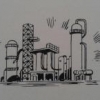Latest Downloads
-
 Water Bath Indirect Heaters
Water Bath Indirect HeatersArt Montemayor - Oct 12 2018 02:35 PM
-
 Petroleum: A Primer for Kansas
Petroleum: A Primer for KansasArt Montemayor - Oct 12 2018 02:27 PM
-
 Spray Tower for Flue Gas Scrubbing Design
Spray Tower for Flue Gas Scrubbing Designankur2061 - May 02 2018 02:31 PM
-
 Selection of Vertical Tanks
Selection of Vertical Tanksankur2061 - Apr 19 2018 07:42 AM
-
 Pressure Drop Calculator for Strainers 1
Pressure Drop Calculator for Strainers 1ankur2061 - Mar 24 2017 02:04 PM
-
 Horizontal Pig Trap System Design Guidelines
Horizontal Pig Trap System Design Guidelinesankur2061 - Jan 14 2017 02:54 PM
-
 Performance Prediction of 3-Stage Propane Refrigeration System
Performance Prediction of 3-Stage Propane Refrigeration Systemankur2061 - Aug 08 2016 02:43 PM
-
 Centrifugal Pump Troubleshooting Checklist
Centrifugal Pump Troubleshooting Checklistankur2061 - Dec 17 2015 08:18 AM
-
 Compressor Troubleshooting Checklist
Compressor Troubleshooting Checklistankur2061 - Sep 08 2015 11:43 AM
-
 Amine Sweetening Unit Preliminary Design
Amine Sweetening Unit Preliminary Designankur2061 - May 19 2015 09:35 AM
Popular Store Titles
 Tank Jacket Calculator
Tank Jacket Calculator
 Specification Sheet Collection
Specification Sheet Collection
 PIPESIZE
PIPESIZE
 Relief Valve Sizing
Relief Valve Sizing
 Rupture Disc Sizing
Rupture Disc Sizing
Chemical and Process Engineering Resources
Submitted Chris Haslego, Nov 21 2011 11:21 AM | Last updated Nov 21 2011 01:29 PM
| Category: | Refining |
| Question: | What is the gasoline octane number? |
| Keywords: | octane,number |
| Answer: | The performance of a spark-ignited gasoline-fueled engine (i.e., an Otto cycle engine) is improved when the gasoline burns and advances quietly with a smooth flame front as it drives the engine's cylinders' pistons rather than knocking or pinging, which indicates that the fuel is detonating instead of burning smoothly. The octane number is a measure of the anti-knock quality of gasoline ... in other words, the ability of the gasoline to resist knocking when it is burned in a spark-ignited Otto cycle engine. Pure iso-octane, which has an excellent anti-knock quality, has been designated as having an octane number of 100. Samples of gasoline are tested by running them in a single-cylinder engine mounted in a laboratory. For example, if a gasoline's anti-knock performance during the test is 85 percent as good as the performance of pure iso-octane in the same test, then that gasoline is said to have an octane number of 85. As another example, if a gasoline's anti-knock performance during the test is 10 percent better than that of pure iso-octane, then that gasoline is said to have and octane number of 110. There are two different sets of engine operating conditions used during the tests to measure the octane number of a gasoline. One set of conditions is used to determine the so-called Research octane number (RON), and another set of conditions is used to determine the so-called Motor octane number (MON). The average of the RON and MON is abbreviated to (R + M)/2 and that is the octane rating which is usually posted at service stations in the US. |
Forum Quick Links
Tech Q & A Category List
-
 Bulk Solids
Bulk Solids
-
 ChE Outside the Plant
ChE Outside the Plant
-
 Chemical Process Business
Chemical Process Business
-
 Chemistry Basics
Chemistry Basics
-
 Corrosion
Corrosion
-
 Equipment Design
Equipment Design
-
 Experimentation and Testing
Experimentation and Testing
-
 Fluid Dynamics
Fluid Dynamics
-
 Heat Transfer Technology
Heat Transfer Technology
-
 Industrial Utilities
Industrial Utilities
-
 Mass Transfer
Mass Transfer
-
 Physical Property Information
Physical Property Information
-
 Plant Basics
Plant Basics
-
 Plant Economics
Plant Economics
-
 Preparing to Become an Engineer
Preparing to Become an Engineer
-
 Process Control
Process Control
-
 Reactions and Processes
Reactions and Processes
-
 Refining
Refining
-
 Safety
Safety
-
 Separation Technology
Separation Technology
-
 The Environment
The Environment
-
 Thermodynamics
Thermodynamics

 FB
FB



0 Comments